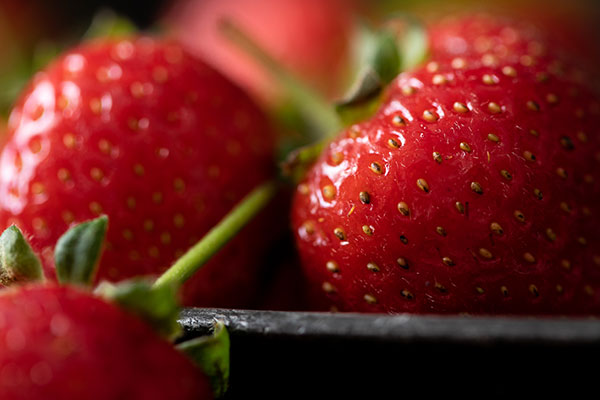The amount of fruit and veg sold in the UK containing a “cocktail” of pesticides has risen in the last year with strawberries and lemons topping the list, an annual pesticide ranking list has revealed.
The so-called ‘Dirty Dozen’ list, which is compiled by the Pesticide Action Network (PAN UK) using government testing data, ranks the fruit and veg that are most likely to contain a cocktail of pesticide residues, with the aim of helping people prioritise what to eat under an organic and non-organic diet.
The list of the 12 worst offenders was topped by strawberries with almost 90 per cent of those tested containing residues of more than one pesticide.
Lemons and prepacked salad leaves came a close second and third, with pesticide cocktails found in more than 80 per cent of tests. Individual samples were found to contain the residues of anywhere up to 14 different pesticides.
“Pesticide residues aren’t listed anywhere on food labels so the Dirty Dozen is the only way for British consumers to get a sense of which pesticides appear in their food,” said Nick Mole, policy officer at PAN UK. “Most of us can’t access a fully organic diet so we hope this information will help people work out which produce to prioritise”.
Just under a third (32 per cent) of all food tested by the government in 2019 (including meat fish, grains and dairy) contained multiple pesticides, up from 23.5 per cent the previous year.
On fruit and veg, 48 per cent of those tested contained a mixture of pesticides, up from 36 per cent on the prior year. Fruit was particularly high, with 67 per cent containing multiple pesticides, as were grains, with 94 per cent of oats and 27 per cent of bread.

Mole added: “The Dirty Dozen reveals that pesticide cocktails remain extremely common in UK food and should be of deep concern to consumers.
“There’s increasing evidence that chemicals can be more harmful when combined, particularly to pregnant women and young children, but we continue to set safety limits for just one pesticide at a time.”
Despite attempts by regulators, PAN UK said it has proved impossible to create a system sufficiently sophisticated to be able to assess the health impacts of long-term exposure to multiple pesticides.
The only way to minimise the risk is to hugely decrease overall pesticide use, the organisation said.
The news comes ahead of the government’s long-awaited National Action Plan on the Sustainable Use of Pesticide, due to be published soon, to introduce a pesticide reduction target and increase financial and other support to British farmers to adopt non-chemical alternatives.















I’d be very interested to know of what pesticides are used. Before turning to an organic diet my son would eat a lot of strawberries. Due to a medical issue I had a hair analysis test undertaken. His arsenic levels were extremely high. I put that down to his high strawberry intake, amongst other non organic fruits.
That is so shocking, and I am glad you have been able to now choose the best diet for your family armed with this knowledge. Pesticide Action Network https://www.pan-uk.org/ are a great resource to find out more about pesticides in conventionally grown food.
Rice is more likely to be the source as most types are grown in soil quite heavily contaminated with arsenic. US rice is fhe worst, basmati from India and Pakistan are better. There’s a lot of info on nutritionfacts.org
Perhaps it may not be the fruits? I’m not sure, however there are many harmful chemicals in tap water that differ in different places.
How effective is rinsing under cold water? What is the recommended way to wash off residues?
Hi timpaine, washing under cold running water will remove some residue, but with pesticides the issue is they can be ‘not just on it, but in it’. The ‘dirty dozen’ list is helpful; if you can buy organic instead it will help eliminate the higher levels of residue those contain from your diet.
Maybe lets just not buy them?
Stick to affordable organic alternatives. The message would seep through?
Yes I agree. Don’t buy them in the first place. Consumers have power in their choices.
Thank you for your very interesting article. Please can you supply the list of the pesticides. I’m in the same situation as VSamuels above. I’m very interested in finding the culprit of the levels of Arsenic present in my son and Mercury in me.
We have decided not to buy any food that is not organic but a farmer I know from Spain swears we have not been told the truth about organic food (not being 100% organic.) Is this possible in the UK?
Thanks for replying.
Hi MillyD,,please rest assured that if your food is certified organic by the Soil Association here in the UK, it will have undergone rigorous testing and farm inspections to ensure it is fully organic. You can choose it with confidence as it will have been grown to strict organic standards. Find out more on their website here: https://www.soilassociation.org/
It is possible that if you drink tap water you are ingesting harmful chemicals. I know that in the USA you can check what is in your tap water. In some parts of Kansas that I have been to last summer the levels of Arsenic in the tap water are 600X the amount of the safety level. However it is not illegal for many water contaminants to be present. You may want to have a look into the water supply where you live or not drink tap water.
When I log into the PAN website the only dirty dozen list I can find (seems to be the latest ) lists Grapefruit then Clementines, mandarins and satsumas as the top two contaminated foods. Strawberries come third. Sorry to nitpick, but which list are you using? You’re right to highlight the cocktail effect. Can’t be pointed out too often what a mix of pesticides, hormone disruptors, plastics, etc, that we ingest every day. A mix, as you say, that’s never tested.
Hi SMD, this article is written using the latest data collected by the government’s Pesticide Residue in Food (PRiF) committee, for the year 2019. The link you mention combines the data for both 2018 and 2019 to give citizens a longer-term view of the data and help them make choices, whereas this article was specifically about the changes in the last year. Hope that helps. Here is the combined data in the full report for ease: https://www.pan-uk.org/site/wp-content/uploads/Pesticides-in-our-food-FINAL.pdf
I find myself more concerned with the risk of the pathogens in animal manure used as fertiliser than the harm to our food system from pesticides. I’d really appreciate it if anyone can explain if my concern is misplaced or if I should be more concerned with one over the other.
Also, does anyone know if Riverford or another produce outlet supplies fruit and veg grown with green (plant-based) manure?
If you are looking for a fully organic produce, Riverford grow veg with a mix of green manures and some animal manure from the organic dairy herd close by. In terms of which is worse – pesticides or pathogens – we are not experts in that field but it seems that as more is being understood about the negative environmental impacts of both synthetic pesticides and intensive animal farming, choosing organic instead will support more planet-friendly farming systems.
Thanks
Rice can contain arsenic levels high enough to cause health concerns, especially if eaten often. This includes rice milk and rice cakes.
In Sweden, for example, it is recommended that children under 6 years old do not eat rice cakes.
Rinsing, and especially soaking, rice before cooking can help to lower the arsenic levels.
Although it is clearly vital to wash fruit and veg before use this only removes some surface contaminants. Most of the pesticide residues are contained within the food itself as a result of seed dressing before sowing and from the cocktail of different sprays applied to crops during their lifetime.